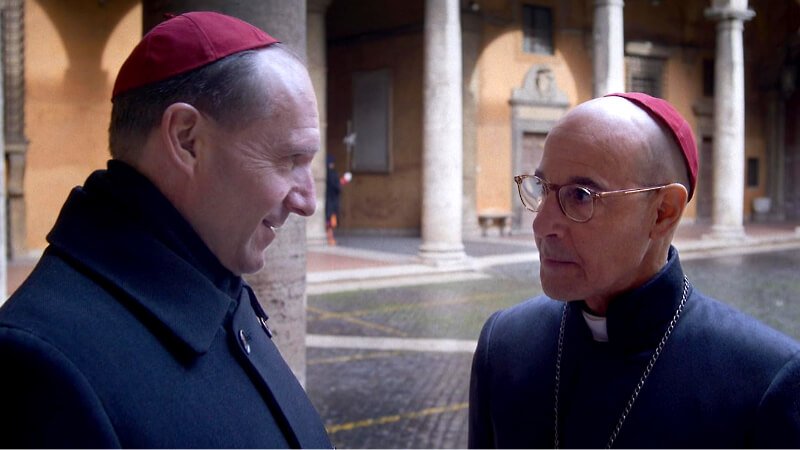It does indeed begin with thriller vibes. A man carrying a briefcase is hurrying down a darkened street. Labored breathing. As he arrives at his destination, we see he is a priest. What’s happening. Why the tension?
It’s Cardinal Thomas Lawrence (Ralph Fiennes). He’s escorted directly to the bedside of the pope, who has just died from a heart attack. As dean of the College of Cardinals, it falls to Lawrence to organize and conduct the conclave at which the next pope will be chosen from among a hundred-some cardinals from around the world.
Puzzling aspects emerge in the days before all the cardinals arrive. Cardinal Joseph Tremblay (John Lithgow) was the last to see his holiness, but refuses to reveal the reason, saying it was a personal matter. Cardinal Vincent Benitez arrives, previously unknown to the rest of his brethren, but he has documentation from the pope saying he was appointed in private for his safety while ministering to Catholics in Kabul, Afghanistan. The honorable Lawrence investigates, determined that the proceedings will be fair and beyond critique.
But, refreshingly, unlike so many other movie plots that hinge on the death of a pope, this may be a bit of a thriller, but it is not a whodunit. We never seriously suspect the pope succumbed to anything other than the infirmity of old age. It’s all about the wrangling that occurs around the upcoming vote. Italian Cardinal Goffredo Tedesco (Sergio Castellitto) represents the faction that believes the trend toward liberalization must be reversed, and he is portrayed as belligerent, even racist. His opposite number is the liberal American Cardinal Aldo Bellini (Stanley Tucci), who declares, and may really believe at first, that his sole reason for wanting to be pope is to ensure Tedesco is not selected. Nigerian Cardinal Joshua Adeyemi (Lucian Msamati) would represent an historic new direction for the church, but he is also a conservative who would reverse recent doctrinal liberalizations. The Canadian Tremblay? Apparently a moderate, whose blatant ambition to be the new pope is the very thing Bellini and Lawrence distrust about him.
Interestingly, the bulk of the horse trading that you know must be a full-time occupation for the candidates occurs mostly off screen. Cardinal Lawrence is himself a British liberal, and since the movie unfolds almost entirely through his eyes, we glimpse his increasingly unsuccessful attempts to bolster Bellini’s candidacy. His steadfast attempts to expose duplicity and hypocrisy on the part of the candidates subjects him to accusations of scheming to promote himself. Though he declares otherwise, he falters in his ambition to step away.
See It
Conclave is a tale of millennia-old ceremony, modern-day piety, and old-fashioned horse trading. It is a slow-burn constructed to wrap around a religious debate the filmmakers urgently want to examine. As entertainment, it works surprisingly well despite its somewhat plodding pace. As a rumination about the future of the Catholic church, I can’t imagine it shifting anyone’s existing attitude.
Fiennes, Tucci, Lithgow, and Msamati inhabit their roles with ease as both actors and as symbols of competing socioreligious dogma. Each portray their various moments of sadness, outrage, and remorse believably. Fiennes’ performance has been singled out for particular praise, and indeed he is splendid, but he also benefits from having such an accomplished ensemble to play alongside. Also worth mentioning is Isabella Rossellini as Sister Agnes, whose devotion to ceremony and process first leads her to avoid participating in Lawrence’s investigations, and then embrace them. She is the master of the imperious stare.
The filmmakers create a world with sumptuous and sometimes jarring details. There’s the scene of the arriving cardinals passing through metal detectors and surrendering their mobile phones. But there’s also the cavernous expanse of the Sistine Chapel, venue for the conclave. Or the darkened and labyrinthine chambers where the cardinals reside. The gloomy lighting and shallow focus that blurs even nearby details, though frustrating, makes sense here in this cloistered world hidden from outside view.
Anyone who’s seen hundreds of movies and is thus familiar with the trajectory of these types of stories can anticipate the denouement immediately. Its major flaw is a final revelation that forces even the honorable Lawrence into hypocrisy. Why?
Watch Conclave for the inspired performances, but not for inspiration. It succeeds in telling a tense, even thrilling story with compelling precision but falls short of conveying a compelling statement that anyone can embrace.
